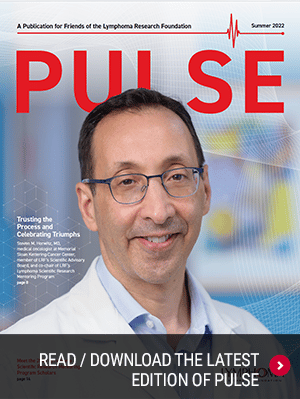ASH 2023: Increased Metabolism in High IRF4-Expressing Lymphoma Cells Limits the Availability of Glucose in the Tumor Microenvironment
Cancer cells routinely reprogram cellular metabolism to improve their fitness, providing a selective advantage that supports growth and expansion. Researchers previously determined that increased expression of the protein IRF4 is associated with altered immune signaling and an immunosuppressive tumor microenvironment in follicular lymphoma (FL), which collectively correlate with poor prognosis. In the present study, presented by LRF grantee Patrizia Mondello, MD, PhD, MSc of Mayo Clinic, Rochester, investigators aimed to determine whether this metabolic reprogramming was directly responsible for the suppression of immune activity in the tumor microenvironment, which may represent an opportunity to identify novel therapeutic targets in FL.
To this end, the investigators performed a series of experiments involving lymphoma cell lines with varying levels of IRF4 expression. They found that cells expressing high levels of IRF4 have increased levels of glucose uptake, and that glucose levels are low in the media that these cells are cultured in. Glucose levels within the environment can influence the growth of immune cells (CD4+ T cells), who also require these molecules as an energy source. The investigators found that when IRF4 activity was suppressed, glucose concentrations in the environment were high, which correlated with an increase in the abundance of immune T cells.
The researchers concluded that glucose levels in the tumor microenvironment serve as fuel for the survival and function of immune cells, and that increased expression of IRF4 expression in lymphoma cells rewires the metabolic properties of cancer cells such that available glucose becomes limited. They suggest that cellular mechanisms involved in glucose metabolism may therefore represent a vulnerability within cancer cells that can be exploited for the development of novel therapeutic strategies.
This study also included contributions from LRF SAB members Stephen Ansell, MD, PhD of Mayo Clinic, Rochester; Laura Pasqualucci, MD of Columbia University; and LRF grantee Anne J. Novak, PhD of Mayo Clinic, Rochester.
Read more highlights from the 2023 American Society of Hematology Annual Meeting in Pulse



